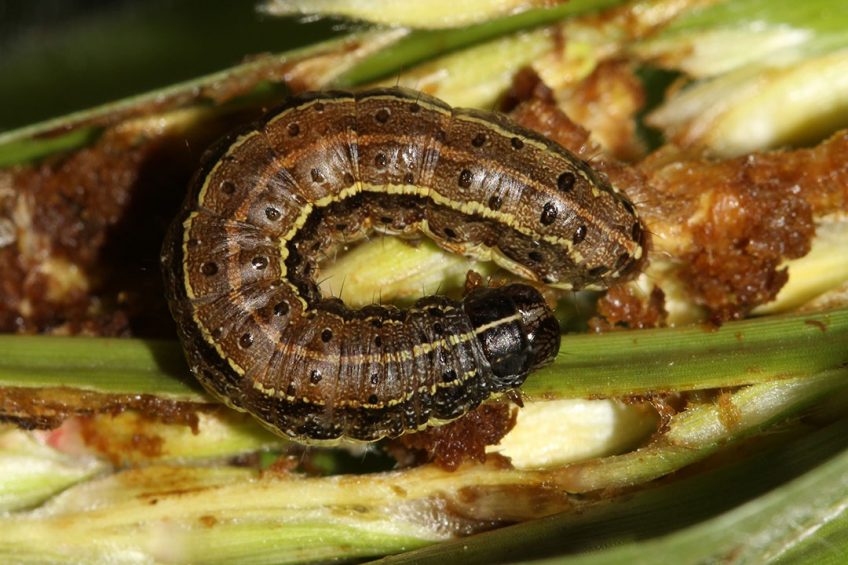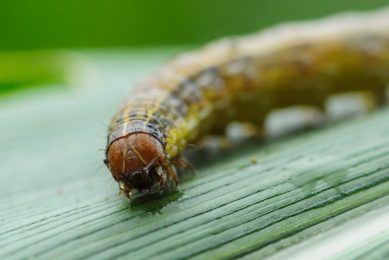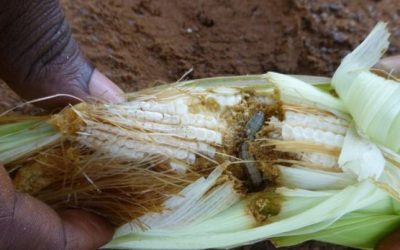Combatting the fall armyworm in Africa with wasps

In Africa, the invasive fall armyworm (FAW) is becoming a serious concern. It has devastating consequences on maize crops, which the region relies on for food and animal feed. A natural enemy – wasps – may assist in managing this crop-destroying pest.
FAW are native to North and South America. They destroy young plants, attacking their growing points and burrowing into the cobs. About 5 years ago it was first discovered in parts of West Africa and was confirmed to be present in Nigeria and São Tomé.
Up to 20 million tonnes of maize destroyed

FAW targets maize, primarily, and in Africa, the cultivation of maize represents one of the most important sources of food security, income generation and employment for over 300 million people. The recent invasion of fall armyworm has led to losses of 8-20 million tonnes of maize across the continent. This has significant and far-reaching consequences on both human food and animal feed.
Use of insecticides to combat fall armyworm invasion
Although broad-spectrum chemical insecticides are used to try and manage the invasion of FAW, in Ethiopia and Kenya, more than 50% of maize growers reported that they only provide marginal control or are ineffective.
Maize-legume intercropping, biopesticides and wasps

Since the first detection of FAW in East Africa, the International Centre of Insect Physiology and Ecology (ICIPE) joined forces with national and international partners to research and better understand the ecology of the pest in Africa. Plus to work toward the development of sustainable management strategies suited for African conditions. Maize-legume intercropping and biopesticides have proven to be key as part of a sustainable management strategy for FAW, but another initiative was born – the release of thousands of indigenous natural enemies (also known as farmers friends), namely wasps, in Kenya.
Mass release of natural enemy to parasitise FAW

“Though fall armyworm is an alien invasive pest, our research has unravelled significant information on widely distributed native parasitoid species in Africa – namely Telenomus remus, Trichogramma chilonis and Cotesia icipe – and their ability to successfully parasitise and kill the invasive pest,” says Dr Samira Mohamed, senior scientist at ICIPE. The approach of the team focussed on evaluating the performance of these native parasitoids on various life stages of fall armyworm to identify the most effective one.
Wasp release showing encouraging results
Toward the end of 2020, ICIPE, together with partners in Kenya, embarked on mass production and release of these parasitoids in fall armyworm hotspots along with other eco-friendly management technologies. So far, over 140,000 wasps each of Telenomus remus and Trichogramma chilonis that parasitise fall armyworm eggs; and 5,000 wasps of Cotesia icipe that parasitise early larval stages of fall armyworm, have been released in 5 counties in Kenya with very encouraging results. “Beyond Kenya, our future plans are to expand the parasitoid release to other Eastern African countries,” says Dr Sevgan Subramanian, principal scientist at ICIPE.
Lower the FAW population

The initial post-release field assessments revealed that parasitism rates of fall armyworm in the field increased by 55%, 50% and 38%, for Trichogramma chilonis, Telenomus remus and Cotesia icipe, respectively. “The released parasitoids work synergistically to bring down the population of fall armyworm by attacking different developmental stages (eggs and larvae) of the pest. However, for these parasitoids to be able to effectively contribute to the suppression of pest, they need to be conserved by minimising application of broad-spectrum chemical insecticides,” added Dr Mohamed.
Insecticide use is detrimental to wasps survival
“Effective conservation and augmentation of these natural enemies is critical for success of biological control of FAW in Africa. However, the current widely practised FAW control methods based on the use of synthetic pesticides, is detrimental to conservation of indigenous natural enemies,” says Subramanian, adding, “Hence, conservation of natural enemies requires both the maize farmers and agricultural policy makers to be aware of,
promote and adopt sustainable FAW management strategies.”
Wasps unlike to eliminate FAW but could maintain levels
Subramanian concludes that, in general, natural enemies and specifically parasitoid work in density dependent manner. “In this regard, they are very unlikely to eliminate their host, in this case FAW. However, if they are well conserved, they can significantly suppress the population of the pest and when used in a holistic IPM approach they will certainly maintain the pest below economically damaging levels.”









